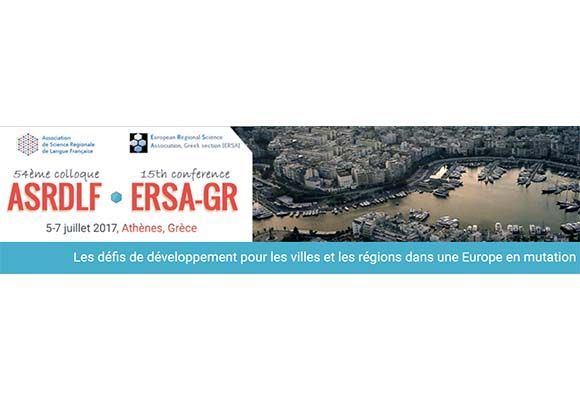Actualité du Labex
Save the date ! - 5 au 7 juillet 2017 colloque ASRDLF
10/02/2017

During colloquium
CITIES AND REGIONS IN A CHANGING EUROPE: CHALLENGES AND PROSPECTS
ATHENS (5-7 JULY 2017)
LabEx ITEM (LabEx Innovation and Mountain Territories) organize a special session (session 18) called :
MARGINAL REGIONS’ PATHWAYS OF ADAPTATION.
A COMPARATIVE APPROACH OF VULNERABLE TERRITORIAL CONTEXTS
This session sets out to question how capable outlying areas are of adapting and their possibilities of developing over time, by focusing on mountainous contexts particularly affected by global climate and economic changes. As such they have a symbolic value as areas-laboratories of change, and represent heuristic study sites for understanding the change in the relationship with the environment and their role in territorial dynamics. Highly inspiring and symbolic, mountains' scenic landscapes and the recreational potential they harbour are very specific assets which also benefit nearby big cities.
At the same time, their economic and environmental vulnerability brings about social and political forms of mobilisation where old territorial issues must be weighed against the new, between infrastructure and urban planning projects, environmental protection requirements and alternative pilot schemes. Mountain areas are thus mulling over the changes affecting centre-outlying area relationships: what new services are provided by non-urban zones, how can these be measured and promoted, should relationships of reciprocity become possible, and under what conditions? This specific context evokes the bigger picture of territorial contexts where the link between economic and environmental vulnerability and territorial appeal is offering up new forms of adaptation.
In these adaptation strategies, what role do environmental factors play alongside economic organisation? Do environmental amenities – which could also be called living environments or landscapes – help to reconstruct the socio-spatial segregation processes observed to date? Do they reduce social inequalities? Likewise, irrespective of their scale and whether or not they are binding, do territorial planning strategies take these new city-mountain relationships on board? With what view taken of the sustainability of development?
You can find the call for abstracts here (http://www.labexitem.fr/en/aac/call-abstracts-54th-annual-colloquium-asrdlf-2017-session-18-outlying-areas-pathways-adaptation)

 Facebook
Facebook Forward
Forward Google+
Google+ LinkedIn
LinkedIn Twitter
Twitter


